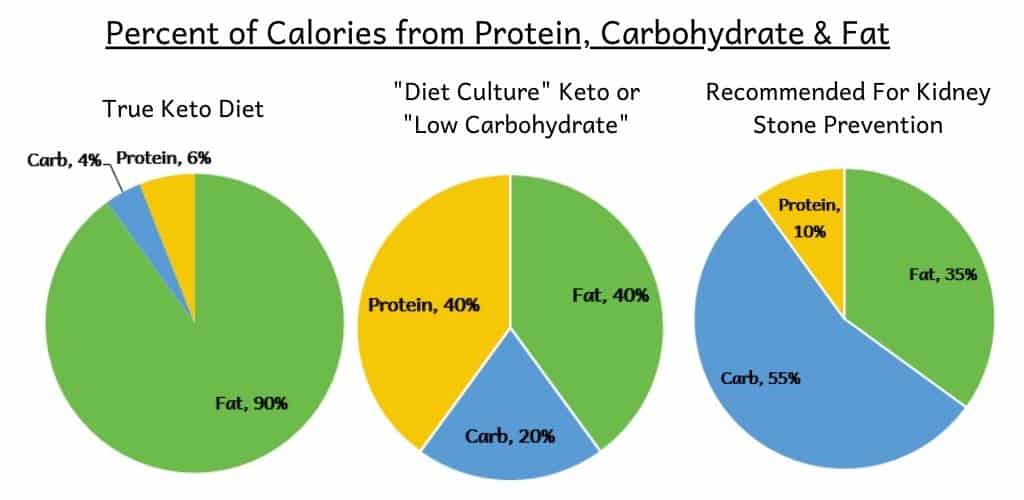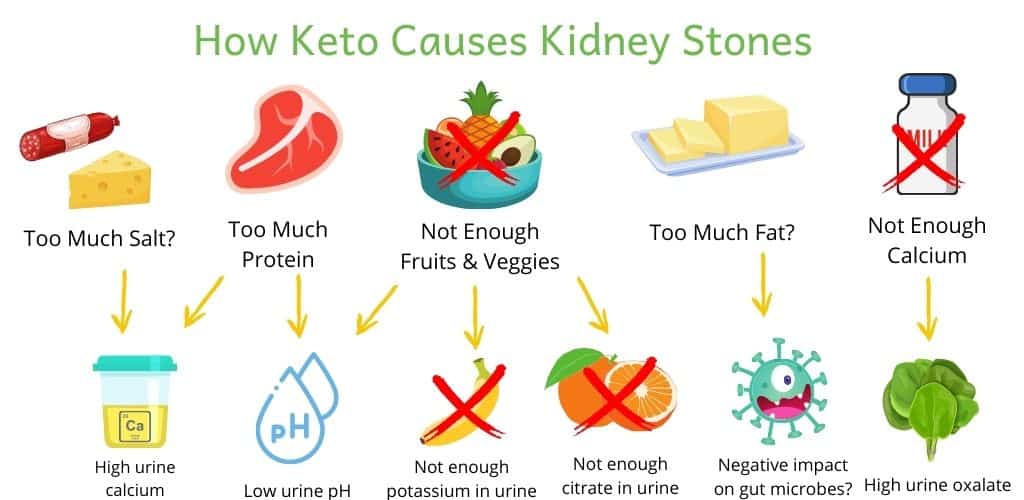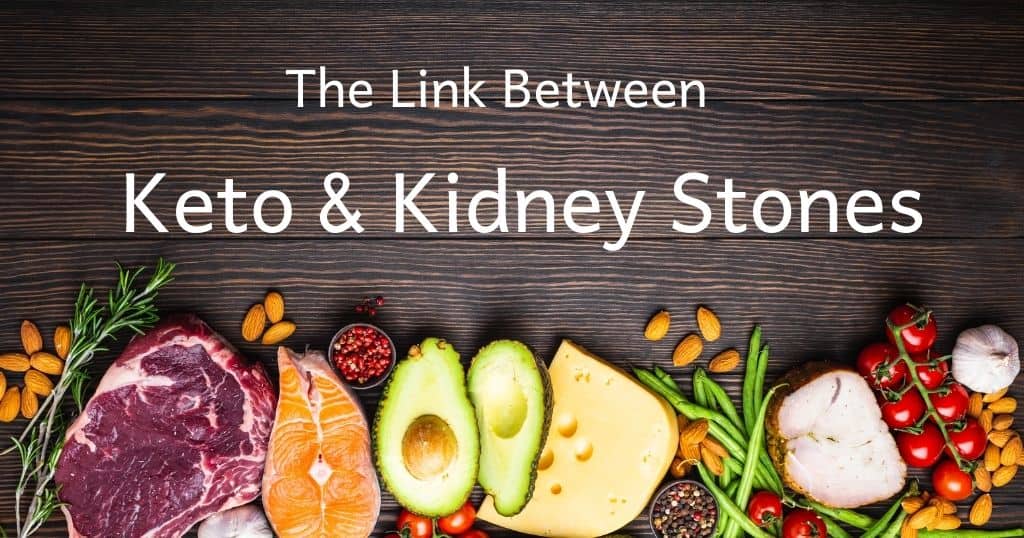No doubt about it, the “keto” (or, ketogenic) diet is incredibly popular. Keto diets claim to cure everything from cancer to dementia. Of course, keto has been made very popular by diet culture as a way to lose weight quick.
But, a little known fact is that keto and kidney stones are connected. Let’s dive into why that might be.
Table of Contents
History of Keto
Firstly, what is a keto diet anyway? The keto diet was developed in 1923 at the Mayo Clinic as a treatment for epilepsy. (1) The keto diet is still commonly used today to treat epilepsy, especially in children.
Fast forward to the 21st century, the keto diet has been studied for many conditions including Alzheimer’s dementia, cognitive decline, heart disease, Polycystic Ovarian Syndrome (PCOS), and acne. A keto diet has shown varying benefits for these and other conditions.
What Is a Keto Diet?
A true keto diet is very high in fat, has some protein and is very low in carbohydrate. Without carbohydrate, our body doesn’t have its preferred source of energy, glucose. The vast majority of the glucose our body uses for energy is derived from dietary carbohydrate. Most of our cells and organs prefer to use glucose for energy.
When we deprive ourselves of carbohydrate, our body makes ketones to use for energy in place of glucose.
The keto diet has been somewhat hijacked by “diet culture”. The term “keto” is now used for diets that are lower in carbohydrate and very high in protein and fat. Although the “diet culture” keto diet is lower in carbohydrate than the average American diet, it is not usually as a true keto diet. A true keto diet only has about 4% of calories from carbohydrate and limits protein.
“Diet culture” keto diets and recipes are filled with seemingly endless amounts of meat, chicken, fish, seafood, nuts, oils, and other fat sources. It also is not usually low enough in carbohydrate (or protein) to cause ketone production.
Both a true keto diet and the “diet culture” keto diet are very different than nutrition recommendations for kidney stones. They are also different than what is recommended for a general healthy diet.

Is A Keto Diet Healthy?
Except for some rare medical conditions, I do not recommend a keto diet for the vast majority of people. A keto diet is not sustainable lifelong. It also restricts many healthy food groups such as whole grains, fruit, dairy, and some vegetables.
In addition, due to excess fat, a keto diet could also increase risk for heart disease, stroke and fatty liver.
High fat diets also appear to have negative impacts on gut bacteria. (2) The community of bacteria that live in our intestines do more for us than we will probably ever know. Changes to the gut bacteria are linked to high blood pressure, inflammation, altered nutrient metabolism, and even kidney disease. (3)
Does Keto Cause Kidney Stones?
In short, yes. Keto can cause kidney stones. (4) Kidney stones are a well known side effect in children who follow a keto diet for epilepsy. In fact, kidney stones are so common, a medication called potassium citrate is sometimes given for prevention. (5)
Unfortunately, no research has investigated the prevalence of kidney stones in adults who follow a keto diet. So, it is difficult to know how likely kidney stones are in adults on a keto diet. Or, the impact of “diet culture” keto diets on kidney stones.
I can report that, in my clinical experience, many of my Kidney Stone Nutrition School students and patients can trace their kidney stones back to a keto diet.
Reasons for the Keto & Kidney Stones Connection
From a biochemical point of view, it makes sense that a keto diet contributes to kidney stones. Here are the possible reasons for the keto kidney stone connection.
Not Enough Fruits and Vegetables on Keto Diets
Perhaps most importantly, keto diets are usually lacking in vegetables. And they are severely lacking in fruit. Fruits and vegetables play many roles for kidney stone prevention. Removing, or severely restricting them, is a likely cause of kidney stones on a keto diet.
Alkali
Alkali production is a huge benefit of fruits and vegetables for kidney stone prevention. During metabolism of fruits and vegetables, our body produces alkali (or, “base” if you want a throwback to high school chemistry).
This alkali is a big deal because it helps neutralize acid that is produced in our body from protein metabolism. Excess acid is excreted in our urine. High levels of urine acid makes the most common types of kidney stones more likely. (6)
On a keto diet, the lack of alkali from fruits and vegetables may be exacerbated by acid production from excess protein.
Citrate
Citrate is a powerful kidney stone inhibitor. It stops kidney stones from forming. Low urine citrate is a risk factor for kidney stones. (6)
Fruit adds a lot of citrate to our diet. Because a keto diet places strict limits on fruit, the lack of citrate may contribute to kidney stones.
Potassium
Urine potassium is another inhibitor of kidney stones. The more potassium we eat, the more potassium in our urine. Although potassium is found in nearly all foods, fruits and vegetables tend to be a main source of potassium in our diet. (6)
Keto diets may cause low urine potassium due to strict limitation of fruits and vegetables, contributing to kidney stones.

Excessive Protein on Keto Diets
Although a true keto diet isn’t high in protein, “diet culture” keto tends to be incredibly high in protein. There isn’t a formal definition for “diet culture” keto, but I would guess many people are easily eating 4x their protein needs.
All this extra protein causes a dramatic drop in urine pH. During metabolism, dietary protein produces acid. Assuming someone has normal kidney function, the body gets rid of extra acid via the urine. High urine acid levels (aka low urine pH) make both uric acid and calcium oxalate kidney stones more likely. (6)
Excess protein can also increase urine calcium, which is another risk factor for kidney stones. (6)
Not Enough Calcium on Keto Diets
Although cheese is typically “allowed” on a keto diet, milk and yogurt are not. Eating calcium rich foods is key to kidney stone prevention and bone health. One study found a 50% reduced risk of kidney stones with adequate calcium intake in people with a history of kidney stones. (7)
Calcium reduces the amount of oxalate absorbed from your food. It is difficult to get enough calcium on a keto diet. This may be another reason for the keto kidney stone connection.
Note: Calcium supplements are not ideal and can increase the risk of kidney stones, whereas calcium rich foods reduce risk.
Possible Changes to Gut Bacteria
We know keto and high fat diets cause changes to the community of bacteria that live in our intestines. (8) We are also just beginning to understand that these bacteria play a role in kidney stone prevention. (9)
The impact of a keto diet on the gut microbiome could be yet another reason for the keto kidney stone connection.
Possible Excess Sodium
Although a high sodium intake isn’t always part of a keto diet, “diet culture” keto diets tend to promote high sodium foods. Cheese, salad dressing, butter, and processed meats are incredibly high in salt.
Excess dietary sodium can increase the amount of calcium in your urine. High urine calcium is the most common cause of kidney stones. A low sodium diet is a hallmark of treatment for most kidney stones. (6) (10)
Avoiding Kidney Stones on Keto
If you need to follow a keto diet for a medical condition, what can you do!? Here are a few tips to help prevent kidney stones on a keto diet:
- Make sure to drink plenty of water. Drinking lots of fluid makes your urine less concentrated, and the chances of a kidney stone less likely.
- Although fruit is off the table, eat as many vegetables as possible. There are many wonderful low carbohydrate vegetables that can fit into a keto diet. Ask your dietitian what is best for you!
- Keep your sodium intake in check. Most people should limit sodium to no more than 2,300mg per day. (10)
- Consider asking your doctor about a potassium citrate prescription.
Healthy Diet To Prevent Kidney Stones
The best way to prevent kidney stones is to eat a well balanced diet that includes fruits, vegetables, whole grains, healthy fats, and proteins. If you want to prevent kidney stones, and do not need to follow a keto diet for medical reasons, I’d advise against a keto diet.
A well balanced diet will also reduce your risk of heart disease, cancer, diabetes, and most chronic conditions.
Here are some general tips to prevent kidney stones on a healthy, well balanced diet: (10)
- Drink plenty of water. About 3 liters of fluid per day is recommended for people with a history of kidney stones.
- Avoid eating more than 2,300mg of sodium in a day.
- Eat a variety of fruits and vegetables. Aim for at least 5 servings per day.
- Avoid foods and beverages with a lot of added sugar. Enjoy these foods on special occasions!
If you have a history of kidney stones, know that there is no one “kidney stone diet” that is best for kidney stone prevention. Nutrition for kidney stones is different based on the type of kidney stone you have, and your 24-hour urine results. Learn more about calcium oxalate or uric acid kidney stones.
Happy Eating!
Melanie


Hi Melanie, thanks for your very good article. My question is ‘what to watch for when the patient has Hashimoto and also eats gluten free?
Thank you, Leila
I’m so glad the article was helpful! I’d have to know more about that patient. There aren’t necessarily any overarching “red flags” when it comes to Hashimoto’s thyroiditis or gluten free diets.
Great breakdown of keto with relation to kidney stones, Melanie. I get calcium oxalate stones due to MSK, so I have to watch my diet. I was doing keto about 10 years ago when it was still a fringe idea. I lost 20 pounds (that I needed to) and I did not experience a greater frequency of kidney stones.
Consider that one of the main attributes of keto is reducing sugar and starches (simple carbs), this is already a positive for our kidneys. However that is offset by a lot more protein. Eating the amount of fat required is what gets difficult, which I accomplished with my version of ‘bulletproof coffee’, or coffee with butter.
I did keto again about 5 years ago. I avoided nearly all simple carbs, getting most of my carbs from vegetables (broccoli, romaine, Brussels sprouts). I rarely salt my food considering the terrifying amount of salt in some of our processed foods. Again, this second time there was not a greater frequency of stone formation.
This is anecdotal, but it is my experience. In my case, I find that I have fewer stones as I lose weight, and more if I gain weight. Also, the more processed foods I eat (high sodium, little to no water), the more stones I produce.
Hi Melanie, this article is so SO important for me!! I have printed it out and underlined and highlighted all the way through it. I have just signed up for a 12 week programme of the Fast 800 (vegetarian) diet to shift some serious weight gain and after signing up was horrified to discover that, although it is not a keto diet per se, it does cause your body to go into ketosis, and now I’m absolutely terrified it will cause me to form another stone. I had an emergency surgery just over a year ago to remove a large stone which had sent me into sepsis. I can’t recall which type of stone it was, I just remember my urologist telling me it was “the most common type”. Should I back out of this programme altogether? Or is the Fast 800 different enough from keto that I will be ok? It’s around 30-40g carbs/pd and 50-60g protein/pd, includes dairy, soy, plant proteins and lots of non-starchy vegetables (including lots of spinach :-((( ) and only berries/rhubarb/apples for fruit. My plan this week for example includes no less than 18 eggs!!! They also tell you to add a little salt to your food to counteract something or other. The programme is that you stick with the Fast 800 for 12 weeks only then transition to the 5:2 and finally when you’re at your target weight you transition again onto a long term Mediterranean-style diet. If I eat a lemon a day and drink bucketloads of water will I be ok???
Hi Alanna! I’m glad you found the article helpful. It is honestly impossible to say if just drinking a ton of water will be enough – everyone is different! I suppose my first question is if you have access to a dietitian as part of this program? Or, one that knows you better to be able to give you a better answer? Any diet that promotes pretty extreme changes and cuts out entire food groups (especially dairy) could cause problems (stones or otherwise) in people who have a tendency to form stones. I don’t know a ton about this particular program, but from what you’ve told me, I’d be cautious.
Melanie,
I evaluated my current diet by using sureketo.com. Surprisingly, they classify foods based upon total fats. They made no distinctions for types of fats. I am trying to improve my ratio of Omega-3 to Omega-6 fats. They did not mention this in rating foods. There was no disclosure of the oxalate content of foods. While I found disclosures of bad ingredients and of better food choices to be helpful, their keto rating system is too crude to provide the information that I need. I regard as absurd the notion that the only purpose of a diet is to lose weight.
Interesting! Unfortunately, many “diets” do only focus on weight loss, and not health. Weight loss certainly does NOT equate to improved health. I’m always skeptical of systems that classify foods as “good” or “bad” – healthy eating is ALL about learning how to put together healthy eating patterns, and definitely NOT adhering to a list of foods that are “good”. Thanks for sharing your experience!
Hi Melanie,
I’m very thankful that I started taking your online class and learned more about my 24 hour urine test. My urine calcium was high at 328.8 in October 2021 as it was 104 in March 2021. I’ve made some changes in my diet. I’m no longer taking calcium supplements and am drinking and eating milk products again with a good enzyme to help me digest the milk.
Again thank you for your help in my kidney stone journey. I also have gluten intolerance and must eat gluten free. My family all got kidney stones much earlier than I did. I got my first kidney stone at 60 years old and it was 10 mm.
Kathryn S.
Hi Kathryn! I’m so glad you are enjoying the course so far. And YAY for the reduced urine calcium. I’m excited to help you continue to tweak your diet to get all of those “urine risk factors” reduced as much as possible!
Hi Melanie. I was diagnosed with pre-diabetes/type 2 diabetes about a year ago. My doctor suggested following a low carb (not necessarily “keto”) diet to lower my blood sugar. It has worked great! After giving up sugar, flour, pasta, potatoes, etc. for a year, my A1C has dropped from 6.5 to 5.8, and I’ve lost about 50 pounds. However, I was recently diagnosed with kidney stones. I’d like to continue my low-carb eating habits while avoiding high-oxalate foods. Your website is one of the few I’ve found with the information I need to do that. Thanks so much!
Hi Louise! Thank you so much for your kind comment! I’m so glad to hear you are doing well. I imagine the key here is balance. As you imply, “low carb” does not mean keto. Most people are probably eating more carbs then they need (think: giant plates of pasta and huge sub sandwiches!). Simply eating carbohydrate (along with most things!) in more appropriate portions can be hugely helpful for diabetes and blood sugar control! Do you know if high urine oxalate is the cause of your stones by chance? There might be other things going on that caused them!